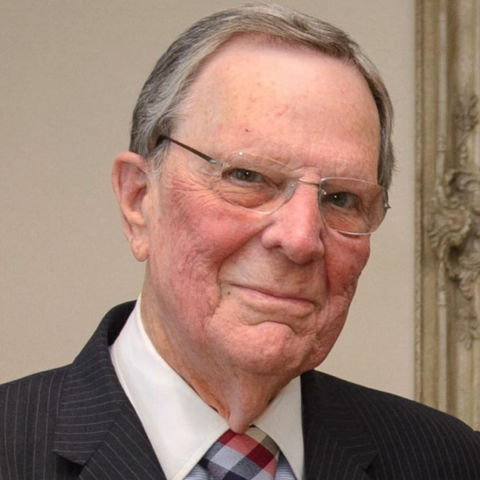Great Conversations Honorees
Shirley Bird Perry Longhorn
Citizenship Award
2026 Award Recipient
Larry Temple

With undergraduate and law degrees from the University of Texas, Larry Temple has given back to his alma mater in nearly every way there is to give. Currently serving as Chairman of the LBJ Foundation, he is the former Chairman of the UT Development Board and President of the Texas Exes. He also shaped statewide higher education policy as Chairman of the Texas Higher Education Coordinating Board, Chairman of the Texas Select Committee on Higher Education, and Chairman of the Texas Committee on Statewide Governance of Higher Education. His commitment to expanding student opportunity is reflected in the Larry Temple Scholarship Endowment established by the UT System Board of Regents in 1990. His distinguished public service career includes serving as Chief of Staff to Governor John Connally and as Special Counsel to President Lyndon B. Johnson. Through his lifelong dedication to educational advancement and the Longhorn community, Larry Temple exemplifies the spirit of citizenship and commitment recognized by the Shirley Bird Perry Longhorn Citizenship Award.
The Shirley Bird Perry Longhorn Citizenship Award recognizes UT students, faculty, staff, administrators, and alumni for individual or collective acts that bring honor to the University community and positively impact civic life. This annual award was created in 2017 by Sam Perry. Like Shirley Bird and her dear friend, Annette Greenfield Strauss, the recipients are to be trusted, impactful, engaged citizens who demonstrate exceptional judgment, compassion for others, boundless energy, and a strong work ethic.
Similarly, Shirley Bird Perry recognized the value and unique qualities of the many students she influenced during her career at The University. Through her guidance and friendship, she helped them uncover talents and purpose beyond what they may have seen in themselves.
Corporate
Citizenship Award
2026 Award Recipient
Siete Foods

Siete Foods is a Texas-born, family-founded food brand rooted in heritage, culture, and the belief that food brings people together. What began as a family passion inspired by Mexican-American traditions has grown into a beloved brand known for its delicious, heritage-inspired portfolio made with thoughtfully selected ingredients. As part of PepsiCo, Siete Foods is entering its next chapter of growth – bringing its foods to even more tables while staying true to its cultural roots and Juntos es Mejor belief. The relationship builds on shared values, amplifying Siete’s entrepreneurial spirit and sense of purpose as the brand reaches more people, supported by PepsiCo’s global reach and long-standing presence. Siete’s connection to the Forty Acres runs deep. Members of the founding family are proud UT alumni and lifelong Longhorn supporters – a Texas pride that naturally aligns with PepsiCo’s own history in the state. Today, PepsiCo’s Texas footprint includes 11 manufacturing facilities, more than 16,000 employees, and the historic roots of Frito-Lay, alongside more than $27 million invested across the state.

